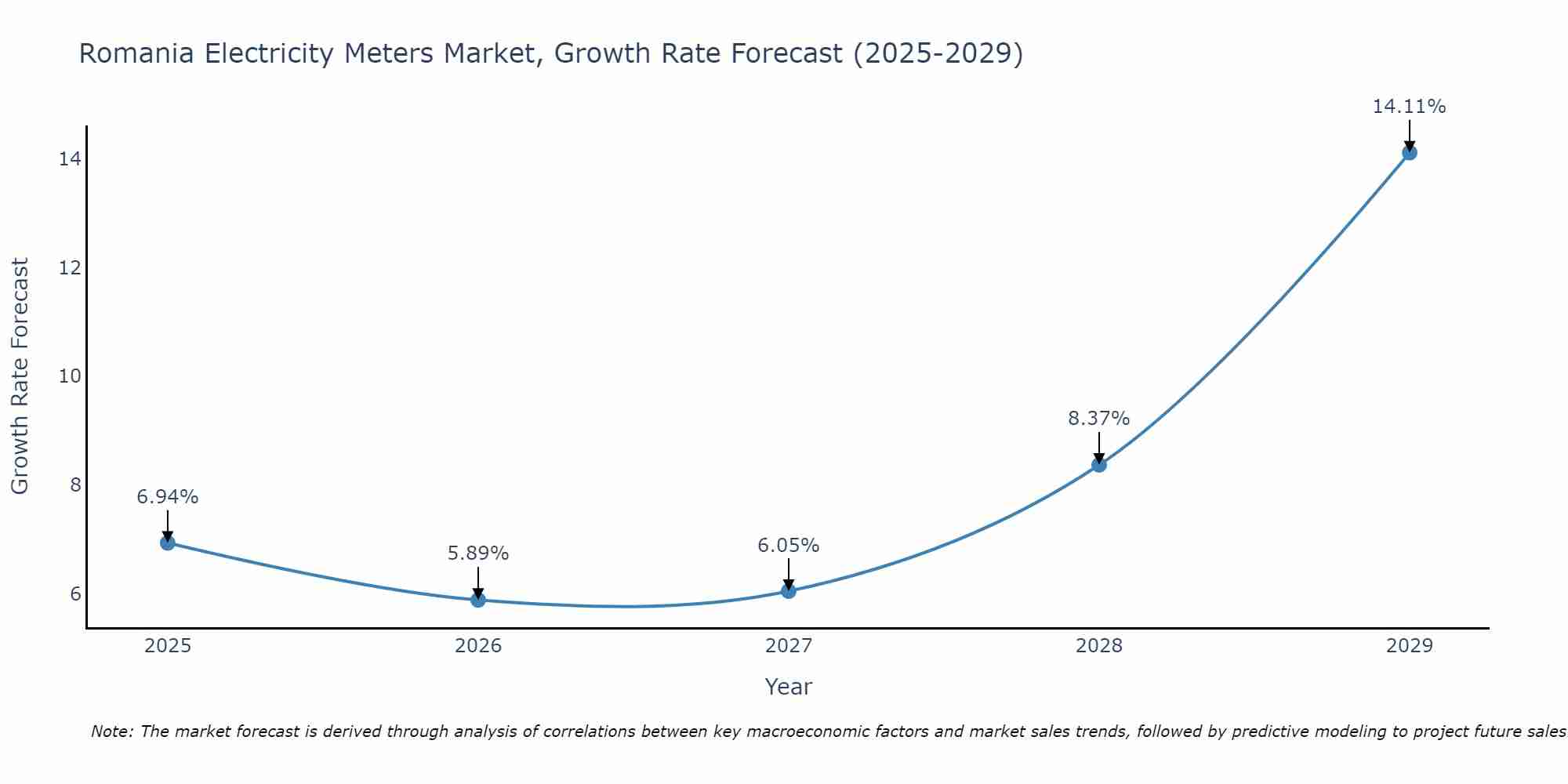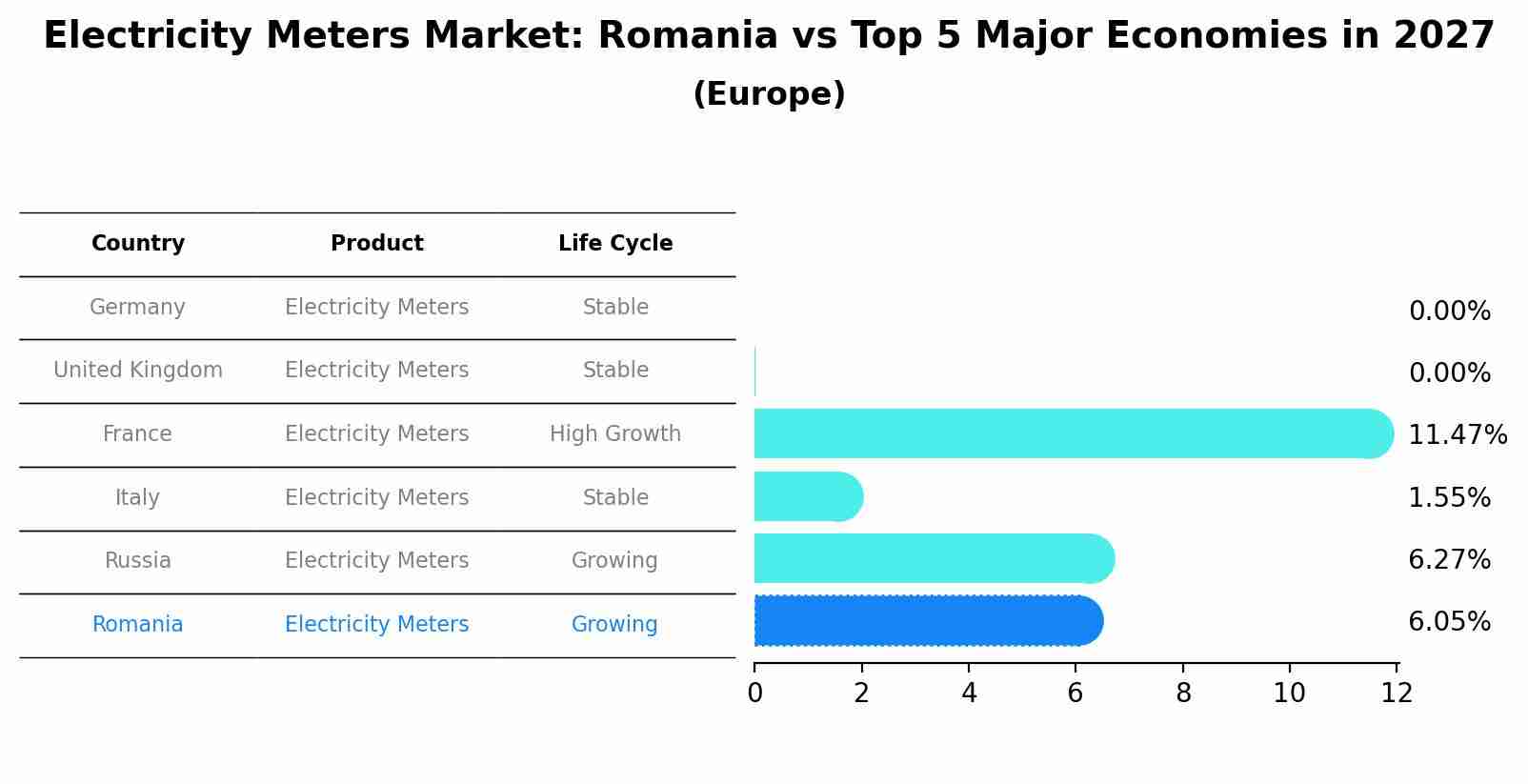Romania Electricity Meters Market Outlook | Industry, Growth, Value, Size, Forecast, Share, Trends, Analysis, Revenue, Companies & COVID-19 IMPACT
| Product Code: ETC432914 | Publication Date: Oct 2022 | Updated Date: Jul 2025 | Product Type: Market Research Report | |
| Publisher: 6Wresearch | Author: Dhaval Chaurasia | No. of Pages: 75 | No. of Figures: 35 | No. of Tables: 20 |
Romania Electricity Meters Market Size Growth Rate
The Romania Electricity Meters Market is projected to witness mixed growth rate patterns during 2025 to 2029. From 6.94% in 2025, the growth rate steadily ascends to 14.11% in 2029.

Electricity Meters Market: Romania vs Top 5 Major Economies in 2027 (Europe)
In the Europe region, the Electricity Meters market in Romania is projected to expand at a growing growth rate of 6.05% by 2027. The largest economy is Germany, followed by United Kingdom, France, Italy and Russia.

Romania Electricity Meters Market Synopsis
The Romania Electricity Meters Market is experiencing steady growth due to factors such as increasing demand for energy efficiency, government initiatives promoting smart meter deployment, and modernization of the electricity infrastructure. Smart meters are gaining popularity in residential, commercial, and industrial sectors, offering benefits such as real-time monitoring, accurate billing, and improved energy management. Key players in the market include Landis+Gyr, Itron Inc., Siemens AG, and Iskraemeco. The market is characterized by ongoing technological advancements, such as the integration of IoT and data analytics capabilities in smart meters, to enhance overall energy management. Regulatory frameworks supporting the adoption of advanced metering infrastructure (AMI) solutions are driving the market growth, with a focus on reducing energy consumption and carbon emissions.
Romania Electricity Meters Market Trends
The Romania Electricity Meters Market is witnessing a shift towards smart meters, driven by government initiatives and regulations aimed at improving energy efficiency and grid management. Smart meters offer real-time data monitoring, remote management, and enhanced energy consumption insights to both consumers and utility companies. This trend is expected to continue as Romania works towards modernizing its energy infrastructure and promoting sustainability. Additionally, there is a growing focus on integrating smart meters with advanced technologies like IoT and data analytics to enable more efficient energy management and personalized services for consumers. The market is also experiencing increased competition among key players, leading to innovations in metering technology and services to meet the evolving needs of the energy sector.
Romania Electricity Meters Market Challenges
In the Romania Electricity Meters Market, some key challenges include regulatory changes impacting metering requirements, interoperability issues with new smart metering technologies, and the need for investment in infrastructure to support the transition to advanced metering systems. Additionally, data privacy concerns and cybersecurity risks present challenges in ensuring the secure collection and transmission of metering data. The market is also affected by the pace of digitalization in the energy sector and the need for utilities to upgrade their metering systems to meet evolving customer expectations. Overall, navigating these challenges requires collaboration between industry stakeholders, regulatory bodies, and technology providers to drive innovation and ensure the effective deployment of modern electricity metering solutions in Romania.
Romania Electricity Meters Market Investment Opportunities
The Romania Electricity Meters Market presents promising investment opportunities due to the country`s ongoing modernization of its energy infrastructure and efforts to improve energy efficiency. With a growing focus on smart grid technology and the adoption of advanced metering solutions, there is a demand for innovative and reliable electricity meters in Romania. Investors can explore opportunities in supplying smart meters, digital meters, and other advanced metering infrastructure products to utility companies and residential or commercial customers. Additionally, there is potential for investment in meter data management systems and software to support efficient data collection and analysis. Overall, the Romania Electricity Meters Market offers a favorable environment for investors looking to capitalize on the country`s energy sector developments and increasing demand for modern metering solutions.
Jordan Agar Market Government Policies
In Romania, the electricity meters market is regulated by the National Energy Regulatory Authority (ANRE). The government has implemented policies to promote the deployment of smart electricity meters to improve energy efficiency and enable better monitoring of electricity consumption. ANRE has set requirements for the installation of smart meters in both residential and commercial buildings, with a focus on increasing accuracy and transparency in billing. Additionally, the government has introduced incentives for consumers to adopt smart meters, such as lower electricity tariffs for those who choose to switch to this advanced technology. Overall, the Romanian government is actively encouraging the adoption of smart electricity meters to modernize the country`s energy infrastructure and promote sustainable energy practices.
Romania Electricity Meters Market Future Outlook
The Romania Electricity Meters Market is expected to see steady growth in the coming years, driven by factors such as increasing urbanization, industrial development, and government initiatives promoting energy efficiency. The market is likely to witness a shift towards smart meters, as well as advancements in technology such as IoT integration and data analytics to optimize energy consumption. With a growing focus on renewable energy sources and sustainability, there will be a rising demand for meters that can accurately measure and monitor electricity usage. Overall, the Romania Electricity Meters Market is poised for expansion and innovation, presenting opportunities for both domestic manufacturers and international suppliers to capitalize on the evolving landscape.
Key Highlights of the Report:
- Romania Electricity Meters Market Outlook
- Market Size of Romania Electricity Meters Market, 2021
- Forecast of Romania Electricity Meters Market, 2031
- Historical Data and Forecast of Romania Electricity Meters Revenues & Volume for the Period 2018 - 2031
- Romania Electricity Meters Market Trend Evolution
- Romania Electricity Meters Market Drivers and Challenges
- Romania Electricity Meters Price Trends
- Romania Electricity Meters Porter's Five Forces
- Romania Electricity Meters Industry Life Cycle
- Historical Data and Forecast of Romania Electricity Meters Market Revenues & Volume By Type for the Period 2018 - 2031
- Historical Data and Forecast of Romania Electricity Meters Market Revenues & Volume By Single Phase for the Period 2018 - 2031
- Historical Data and Forecast of Romania Electricity Meters Market Revenues & Volume By Three Phase for the Period 2018 - 2031
- Historical Data and Forecast of Romania Electricity Meters Market Revenues & Volume By Analog for the Period 2018 - 2031
- Historical Data and Forecast of Romania Electricity Meters Market Revenues & Volume By Smart for the Period 2018 - 2031
- Historical Data and Forecast of Romania Electricity Meters Market Revenues & Volume By Application for the Period 2018 - 2031
- Historical Data and Forecast of Romania Electricity Meters Market Revenues & Volume By Residential for the Period 2018 - 2031
- Historical Data and Forecast of Romania Electricity Meters Market Revenues & Volume By Commercial for the Period 2018 - 2031
- Historical Data and Forecast of Romania Electricity Meters Market Revenues & Volume By Industrial for the Period 2018 - 2031
- Historical Data and Forecast of Romania Electricity Meters Market Revenues & Volume By Others for the Period 2018 - 2031
- Romania Electricity Meters Import Export Trade Statistics
- Market Opportunity Assessment By Type
- Market Opportunity Assessment By Application
- Romania Electricity Meters Top Companies Market Share
- Romania Electricity Meters Competitive Benchmarking By Technical and Operational Parameters
- Romania Electricity Meters Company Profiles
- Romania Electricity Meters Key Strategic Recommendations
Frequently Asked Questions About the Market Study (FAQs):
- Single User License$ 1,995
- Department License$ 2,400
- Site License$ 3,120
- Global License$ 3,795
Search
Thought Leadership and Analyst Meet
Our Clients
Related Reports
- Afghanistan Rocking Chairs And Adirondack Chairs Market (2026-2032) | Size & Revenue, Competitive Landscape, Share, Segmentation, Industry, Value, Outlook, Analysis, Trends, Growth, Forecast, Companies
- Afghanistan Apparel Market (2026-2032) | Growth, Outlook, Industry, Segmentation, Forecast, Size, Companies, Trends, Value, Share, Analysis & Revenue
- Canada Oil and Gas Market (2026-2032) | Share, Segmentation, Value, Industry, Trends, Forecast, Analysis, Size & Revenue, Growth, Competitive Landscape, Outlook, Companies
- Germany Breakfast Food Market (2026-2032) | Industry, Share, Growth, Size, Companies, Value, Analysis, Revenue, Trends, Forecast & Outlook
- Australia Briquette Market (2025-2031) | Growth, Size, Revenue, Forecast, Analysis, Trends, Value, Share, Industry & Companies
- Vietnam System Integrator Market (2025-2031) | Size, Companies, Analysis, Industry, Value, Forecast, Growth, Trends, Revenue & Share
- ASEAN and Thailand Brain Health Supplements Market (2025-2031) | Strategy, Consumer Insights, Analysis, Investment Trends, Opportunities, Growth, Size, Share, Industry, Revenue, Segments, Value, Segmentation, Supply, Forecast, Restraints, Outlook, Competition, Drivers, Trends, Demand, Pricing Analysis, Competitive, Strategic Insights, Companies, Challenges
- ASEAN Bearings Market (2025-2031) | Strategy, Consumer Insights, Analysis, Investment Trends, Opportunities, Growth, Size, Share, Industry, Revenue, Segments, Value, Segmentation, Supply, Forecast, Restraints, Outlook, Competition, Drivers, Trends, Demand, Pricing Analysis, Competitive, Strategic Insights, Companies, Challenges
- Europe Flooring Market (2025-2031) | Outlook, Share, Industry, Trends, Forecast, Companies, Revenue, Size, Analysis, Growth & Value
- Saudi Arabia Manlift Market (2025-2031) | Outlook, Size, Growth, Trends, Companies, Industry, Revenue, Value, Share, Forecast & Analysis
Industry Events and Analyst Meet
Whitepaper
- Middle East & Africa Commercial Security Market Click here to view more.
- Middle East & Africa Fire Safety Systems & Equipment Market Click here to view more.
- GCC Drone Market Click here to view more.
- Middle East Lighting Fixture Market Click here to view more.
- GCC Physical & Perimeter Security Market Click here to view more.
6WResearch In News
- Doha a strategic location for EV manufacturing hub: IPA Qatar
- Demand for luxury TVs surging in the GCC, says Samsung
- Empowering Growth: The Thriving Journey of Bangladesh’s Cable Industry
- Demand for luxury TVs surging in the GCC, says Samsung
- Video call with a traditional healer? Once unthinkable, it’s now common in South Africa
- Intelligent Buildings To Smooth GCC’s Path To Net Zero


















